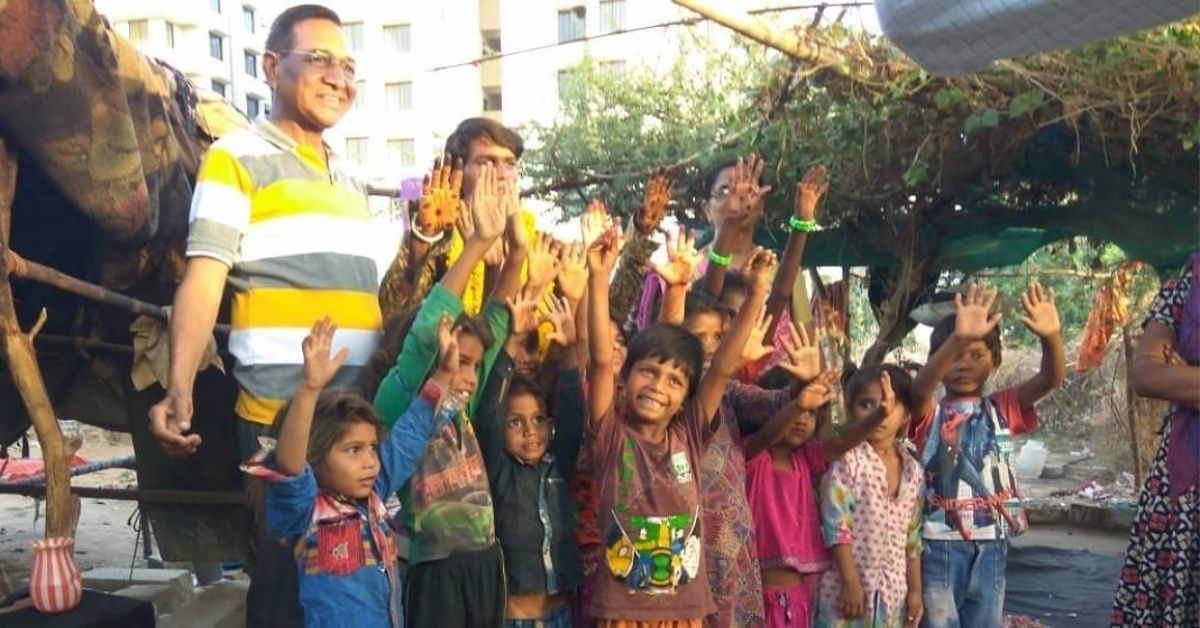Jayanti Patel clearly recalls the day he first saw Mithuram begging on the streets of Gujarat’s Mehsana district. With sleepy eyes, a rusty bowl in one hand, and a hair full of lice, Mithuram begged him for money to manage just one day’s meal.
Moved by what he was seeing, Jayanti, who had just started a new education initiative in Nugar village for child beggars, decided to enroll Mithuram in a government school. The next day, the Class 3 student had a roof over his head and access to hot food, alongside tuition from Jayanti.
Now, 15 years later, Mithuram is earning Rs 12,000 per month and has purchased a small flat using his and his younger brother’s savings.
“Had it not been for Jayanti dada, we would still be begging on streets. My parents forced us to beg because they didn’t get stable earnings, so I have spent hours searching for food. I have even rummaged through garbage to fill our stomachs. Our lives changed drastically because of education,” Mithuram tells The Better India.

Like Muthuram, the lives of hundreds of child beggars have changed for the better, thanks to the efforts of Jayanti (66) and his wife Aruna (60), who have been working tirelessly for the cause over the last 15 years.
“I have been contributing to the social sector ever since I started working. When my wife and I lived in Palampur, we used to often meet Pandurang Shastri Athavale, a social reformer who emphasised on people’s welfare. His work inspired us, so after retirement, we moved to Mehsana and started an initiative to eliminate child begging. We had the time and resources,” says Jayanti.
‘Part of our routine’
Jayanti pursued B.Com followed by LLB, and worked in different sectors, including water pumps and pharma, over the years. It was during his last stint in a pharma company that pushed him towards the subject of nutrition and a healthy lifestyle.
“I have dealt with several companies that manufacture medicines, and most experts would joke that if everyone adopted a healthy lifestyle, medicine manufacturers would suffer losses. I started researching healthy lifestyles, and soon, was invited to talk about it at the corporation level. But nutrition comes at a price and the poor, who need it the most, cannot afford it. This thought pushed me to work with children,” says Jayanti.
The 65-year-old knew that simply giving food to child beggars was a short term solution. Empowering them with education was the only way out of the poverty cycle.
Jayanti and Aruna would go around in the village and slum areas to convince parents to not force their children into begging.
“It was hard for them to believe us when we said education could improve their lives. We did not even have case studies of children as proof. If the child came to us, they would not get their day’s earnings. All we could do was promise meals. In the first year, we were able to get only 45 children,” says Aruna, who also cooks khichdi every day for visitors in the civil hospital.
Along with enrolling children in the government schools, the couple provides stationery, uniforms, food, extra classes, and most importantly, shelter. They make makeshift tents on government land for the children to stay in instead of living on footpaths.
While Jayanti does not need permission to set up the tents, he has had to shift locations due to the municipal corporation’s intervention. However, over the years, everyone including the local government has come to know the couple and their work.
Close to 497 students from classes 1 to 10 have been associated with the couple’s initiative, Mukt Shikshit Samaj Abhiyan. Of this, 30 students have found jobs such as cooks, plumbers, drivers and more. A few of them are running their tea shops.
“It is not possible for us to sponsor their education beyond class 10 as we want to focus only on the young minds that are critical to shape early on. But the good thing is that the ones who are earning now often come back and teach existing students,” adds Jayanti.
The couple spends around Rs 20 lakh every year on the children. They arrange the majority of the funds through donations and CSR activities.
Due to the monetary relief, the couple has been able to successfully run their second initiative on food wastage called Akshay Rath Abhiyan.
Seeing the massive food wastage in social gatherings like weddings, the couple started collecting leftover food and distributing it among the homeless a couple of years ago. “If there is any occasion in or outside the village within a radius of up to 15 km, people call us to collect the food. We use our car to collect and deliver. Aruna cleans the utensils, packs them properly and gives them to the poor. Now we are getting enough food to feed 500 to 3,000 people a day,” says Jayanti.
When asked for how long the couple plans to continue the two initiatives, given their old age, Aruna says, “Till our intellectual and physical abilities work. Taking care of the children has become part of our routine. We don’t believe it is something that we can just discontinue randomly, just like brushing our teeth.”
You can reach the couple at +919879106530
Edited by Divya Sethu
No comments:
Post a Comment